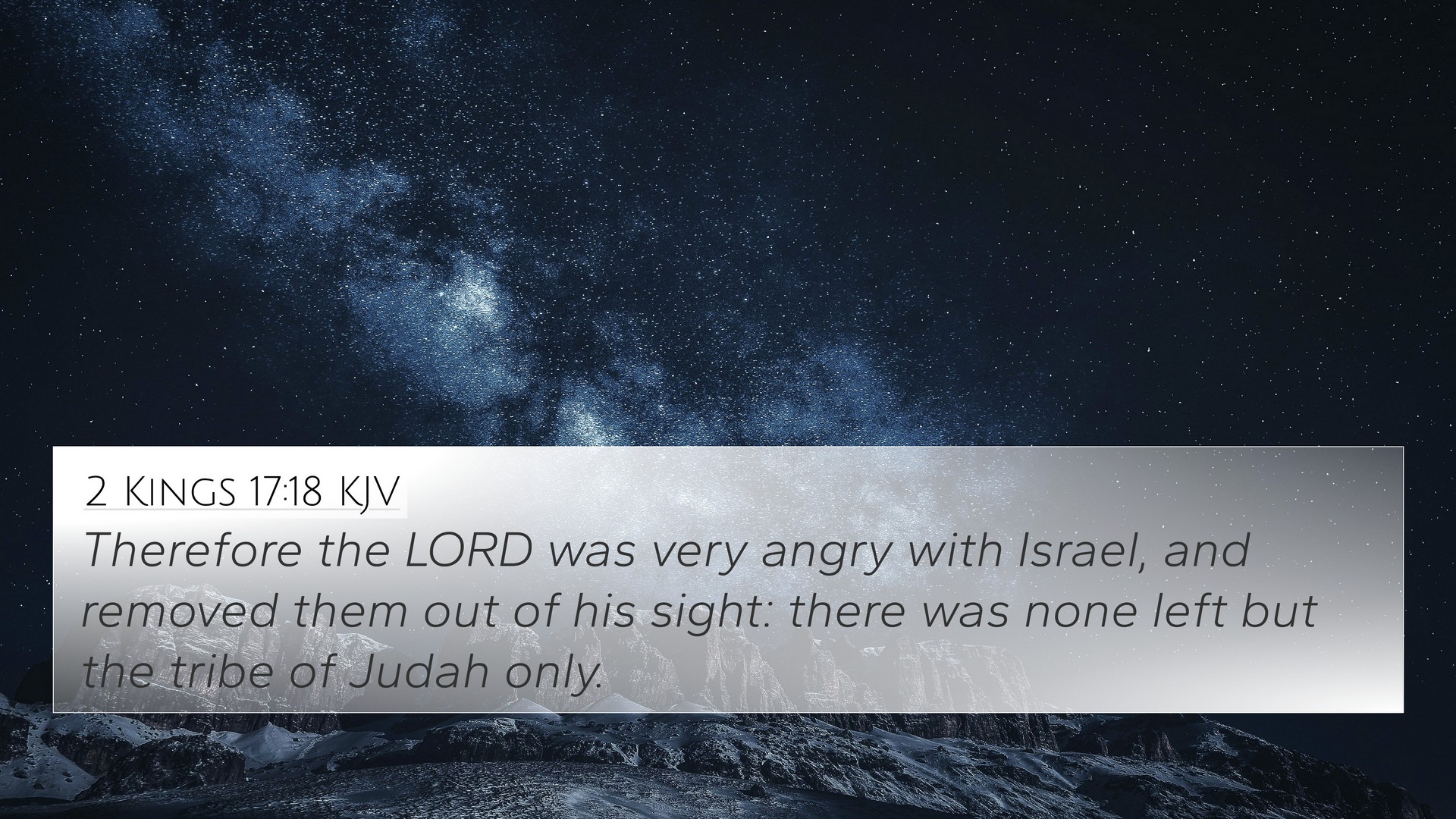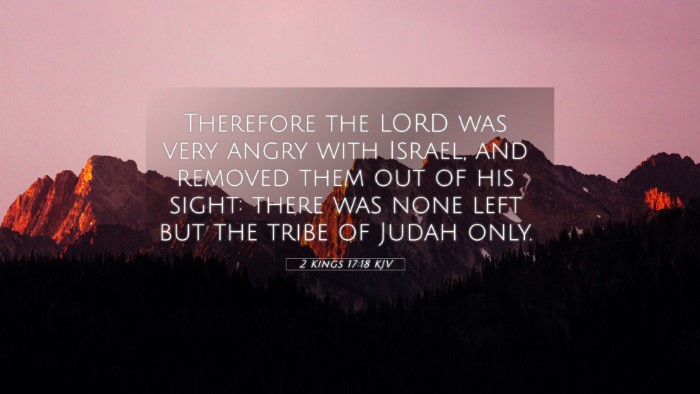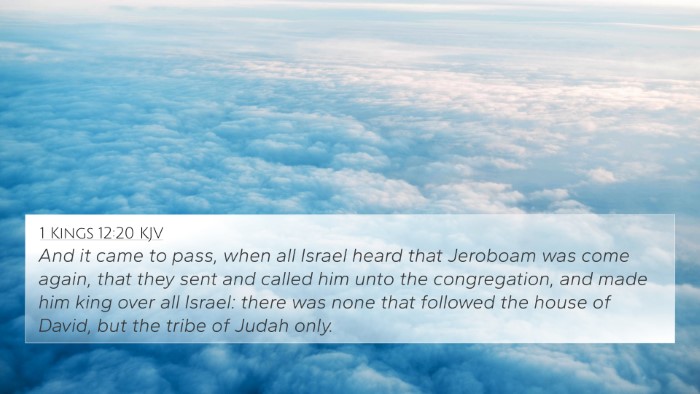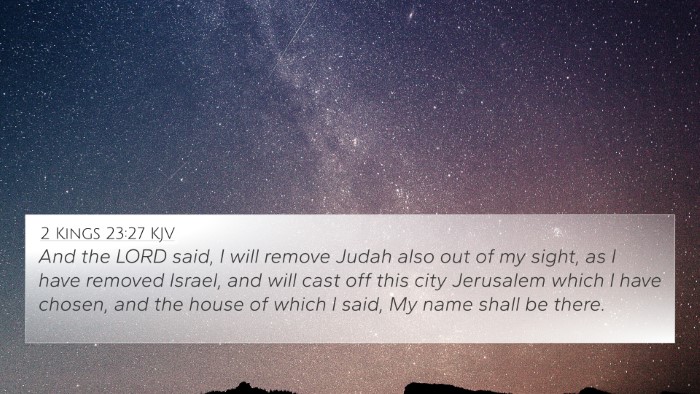Understanding 2 Kings 17:18
In 2 Kings 17:18, the Scripture states: "Therefore the Lord was very angry with Israel and removed them out of his sight: there was none left but the tribe of Judah only." This verse provides a poignant summary of God's judgment and the consequences of Israel's idolatry and disobedience.
General Context
This verse falls within the account of the fall of the northern kingdom of Israel. After the reign of King Jeroboam, Israel turned from God, engaging in idolatry and unfaithfulness. As a result, God's patience wore thin, culminating in the exile of the Israelites. The reference to the tribe of Judah highlights the remnant that remains faithful, setting the stage for future restoration.
Commentary Insights
-
Matthew Henry:
Henry emphasizes the seriousness of Israel's rebellion against God. He notes that the anger of the Lord was justified given the magnitude of their sins. The reference to Judah remaining signifies God's commitment to His promises, which will ultimately lead to the coming of the Messiah.
-
Albert Barnes:
Barnes discusses the implications of divine removal. He highlights that the removal of Israel from God's sight indicates a complete severance in the relationship due to persistent disobedience. Yet, he provides hope in the form of the tribe of Judah, suggesting that God's covenant is not abandoned.
-
Adam Clarke:
Clarke illustrates the theological ramifications of this verse, asserting that the exile serves as a powerful warning against turning away from God. He comments on the historical significance of Judah being left, as it assures that the lineage of David and the coming of the promised Savior are preserved.
Cross-References
A deeper understanding of 2 Kings 17:18 can be gained through various cross-references. Here are key verses that connect with the themes presented:
- Deuteronomy 28:49-51: This passage discusses the consequences of disobedience to God and the eventual exile.
- Jeremiah 31:35-37: This refers to God's unwavering commitment to Israel, even in judgment.
- Isaiah 10:5-6: Isaiah speaks about Assyria as the instrument of God's wrath against an unfaithful Israel.
- 2 Chronicles 36:15-19: This describes the siege and destruction of Jerusalem, emphasizing God's warnings through the prophets.
- Romans 11:1-5: Paul explains how God has not rejected His people, affirming the remnant theme.
- Matthew 1:12: The genealogy of Christ underscores the importance of Judah's survival.
- Ezekiel 37:21-22: Promises restoration to both Judah and Israel, hinting at the reunification of the tribes.
Thematic Connections
The events surrounding 2 Kings 17:18 illuminate strong themes of judgment, mercy, and vindication of God's promises. Such themes weave through numerous Biblical passages, creating a rich tapestry of divinely guided narrative.
Linking Scriptures for a Comparative Study
-
Hebrews 8:13: Describes the old covenant as obsolete, pointing to a new plan where God restores His relationship with His people.
-
Luke 19:44: Jesus weeps over Jerusalem, symbolizing the consequences of unfaithfulness experienced by both Israel and Judah.
-
1 Peter 2:9: Speaks of God's people as a chosen generation, echoing God's intent to have a faithful remnant.
Conclusion
2 Kings 17:18 serves as a stark reminder of the gravity of turning away from God. Through careful study and cross-referencing with related scriptures, one can gain a comprehensive understanding of God's redemptive plan through judgment and hope. Themes of faithfulness, consequence, and the promise of restoration resonate throughout the Bible, encouraging deep reflection and study. By engaging in inter-Biblical dialogue, believers can further explore the dynamic connections between various verses, deepening their understanding of God's character and His covenant with humanity.
Understanding the connections between these verses, along with utilizing tools for Bible cross-referencing, enhances one's study experience and provides greater insights into the overall Biblical narrative.















